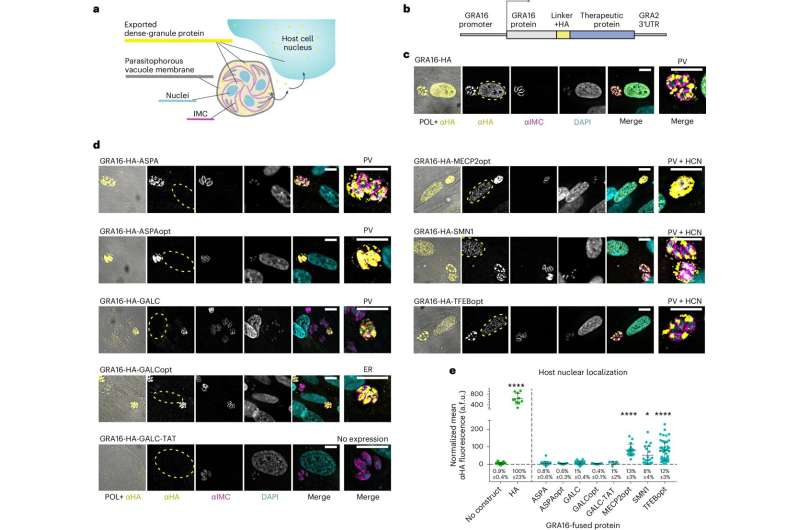July 30, 2024 report
This article has been reviewed according to Science X's editorial process and policies. Editors have highlighted the following attributes while ensuring the content's credibility:
fact-checked
peer-reviewed publication
trusted source
proofread
Parasite engineered to deliver therapy proteins to nerve cells

An international team of neurobiologists has developed a way to use a parasite to deliver protein therapies through the blood–brain barrier to treat nerve cell disorders. In their study published in Nature Microbiology, the group engineered the parasite Toxoplasma gondii to produce a protein to treat a brain disorder.
The journal has published a Research Briefing in the same issue describing the work done by the team.
Treating some brain illnesses has proven to be difficult due to the problem of transporting pharmaceuticals through the blood–brain barrier. For this new study, the research team found a way to overcome this problem by engineering a parasite that is natively capable of passing through the barrier.
Toxoplasma gondii is a common parasite in warm-blooded animals—prior research has shown that it easily travels from the gut to the brain. Most people infected with the parasite are unaware of it; some, however, develop a condition called toxoplasmosis, which can cause a variety of problems in the brain.
Prior research has shown that the parasite has three organelles that secrete substances for its own use. The research team engineered two of them to secrete proteins that are currently used to treat some neurological ailments. They then tested them to see how well they worked.
The first involved testing with human brain organoids. The researchers introduced T. gondii, engineered to produce and deliver a protein called MeCP2, which is used as a treatment for Rett syndrome, into the organoids. They found that the engineered parasites made their way to the desired neurons and successfully delivered the protein.
The team next tested their engineered parasite on live mice in three ways. First, they simply injected the mice with saline containing engineered T. gondii. In the second trial, they did the same with T. gondii that had not been engineered, and in the third, they injected saline with no T. gondii.
The team found that engineering T. gondii did not interfere with its ability to cross the blood–brainbarrier or incite inflammation. They suggest this is just the first step in using the approach for treating neurological disorders in the future.
More information: Shahar Bracha et al, Engineering Toxoplasma gondii secretion systems for intracellular delivery of multiple large therapeutic proteins to neurons, Nature Microbiology (2024). DOI: 10.1038/s41564-024-01750-6
Harnessing a brain parasite as a tool for delivery of therapeutics to the brain, Nature Microbiology (2024). DOI: 10.1038/s41564-024-01772-0
Journal information: Nature Microbiology
© 2024 Science X Network



















